- Home
- James Axler
Damnation Road Show
Damnation Road Show Read online
The rider removed his steel mask and bowed deeply
The crowd jumped to its feet, cheering.
Amid the tumult, something on the far side of the center ring caught Ryan’s eye. Something flashed behind the mirror wall of the facing trailer. And for a fraction of a second, the silver reflective glass became vaguely, hazily transparent, as if through a pall of oily brown smoke.
Then it was over.
In that frozen moment Ryan glimpsed a ghostly figure whose afterimage was burned deeply into his brain. Spindly-limbed. Slouching. Menacing. Even if he hadn’t seen the glare of the light on the steel, he would have known who it was.
The Magus.
Other titles in the Deathlands saga:
Pilgrimage to Hell
Red Holocaust
Neutron Solstice
Crater Lake
Homeward Bound
Pony Soldiers
Dectra Chain
Ice and Fire
Red Equinox
Northstar Rising
Time Nomads
Latitude Zero
Seedling
Dark Carnival
Chill Factor
Moon Fate
Fury’s Pilgrims
Shockscape
Deep Empire
Cold Asylum
Twilight Children
Rider, Reaper
Road Wars
Trader Redux
Genesis Echo
Shadowfall
Ground Zero
Emerald Fire
Bloodlines
Crossways
Keepers of the Sun
Circle Thrice
Eclipse at Noon
Stoneface
Bitter Fruit
Skydark
Demons of Eden
The Mars Arena
Watersleep
Nightmare Passage
Freedom Lost
Way of the Wolf
Dark Emblem
Crucible of Time
Starfall
Encounter: Collector’s Edition
Gemini Rising
Gaia’s Demise
Dark Reckoning
Shadow World
Pandora’s Redoubt
Rat King
Zero City
Savage Armada
Judas Strike
Shadow Fortress
Sunchild
Breakthrough
Salvation Road
Amazon Gate
Destiny’s Truth
Skydark Spawn
JAMES AXLER
DEATH LANDS®
Damnation Road Show
O eyes, no eyes, but fountains fraught with tears;
O life, no life, but lively form of death;
O world, no world, but mass of public wrongs,
Confused and filled with murder and misdeeds.
—Thomas Kyd,
1558-1594
THE DEATHLANDS SAGA
* * *
This world is their legacy, a world born in the violent nuclear spasm of 2001 that was the bitter outcome of a struggle for global dominance.
There is no real escape from this shockscape where life always hangs in the balance, vulnerable to newly demonic nature, barbarism, lawlessness.
But they are the warrior survivalists, and they endure—in the way of the lion, the hawk and the tiger, true to nature’s heart despite its ruination.
Ryan Cawdor: The privileged son of an East Coast baron. Acquainted with betrayal from a tender age, he is a master of the hard realities.
Krysty Wroth: Harmony ville’s own Titian-haired beauty, a woman with the strength of tempered steel. Her premonitions and Gaia powers have been fostered by her Mother Sonja.
J. B. Dix, the Armorer: Weapons master and Ryan’s close ally, he, too, honed his skills traversing the Deathlands with the legendary Trader.
Doctor Theophilus Tanner: Torn from his family and a gentler life in 1896, Doc has been thrown into a future he couldn’t have imagined.
Dr. Mildred Wyeth: Her father was killed by the Ku Klux Klan, but her fate is not much lighter. Restored from predark cryogenic suspension, she brings twentieth-century healing skills to a nightmare.
Jak Lauren: A true child of the wastelands, reared on adversity, loss and danger, the albino teenager is a fierce fighter and loyal friend.
Dean Cawdor: Ryan’s young son by Sharona accepts the only world he knows, and yet he is the seedling bearing the promise of tomorrow.
In a world where all was lost, they are humanity’s last hope….
* * *
Contents
Prologue
Chapter One
Chapter Two
Chapter Three
Chapter Four
Chapter Five
Chapter Six
Chapter Seven
Chapter Eight
Chapter Nine
Chapter Ten
Chapter Eleven
Chapter Twelve
Chapter Thirteen
Chapter Fourteen
Chapter Fifteen
Chapter Sixteen
Chapter Seventeen
Chapter Eighteen
Chapter Nineteen
Chapter Twenty
Chapter Twenty-One
Chapter Twenty-Two
Chapter Twenty-Three
Chapter Twenty-Four
Chapter Twenty-Five
Chapter Twenty-Six
Chapter Twenty-Seven
Chapter Twenty-Eight
Chapter Twenty-Nine
Chapter Thirty
Chapter Thirty-One
Chapter Thirty-Two
Chapter Thirty-Three
Chapter Thirty-Four
Chapter Thirty-Five
Prologue
Evening hung dead still and oppressively humid over the shallow, five-acre, seep-fed lake, the lavender dome of sky perfectly reflected in its mercury-smooth surface. Encircling the muddy bank was a fringe of stripped, bleached skeletons of trees. The intense quiet was neither peaceful nor serene; the very air seemed to vibrate in anticipation and dread. Terrible forces of nature were about to make themselves known.
Swish-swish.
Swish-swish.
From the north end of the lake came a rhythmic sound.
Not a bird, not an insect. Sensing the impending hell show, the birds and insects had gone to ground.
A tall human figure stood on the bank in hip boots, waving a nine-foot-long, flexible rod back and forth. And as he did so, he sailed a bright-yellow line through the air, forward and back, forward and back, in a tight loop, out over the purple mirror of sky. The man wore a long, pointy, black goatee and his black hair was loosely tied in a ponytail, which hung to the middle of his back. On his head was a tatter-brimmed straw cowboy hat. His eyes were hidden behind wraparound sunglasses.
What face was visible was long, gaunt, perhaps tragic, certainly suffering, certainly world weary.
As the man cast, the water in front of him swirled and gurgled. The head of a huge mutie lungfish appeared in the middle of the ripples. The fish looked up at the man, then struggled out of the pool, walking on the bony spikes of its pectoral fins. Greenish-gray on the back with a light cream-colored belly, the mutie was easily five feet long and weighed more than sixty pounds. As it dragged itself from the world of fish into the world of men, its large, rubbery lipped mouth and its gill covers opened and closed, breathing air. Grunting from the effort, the lungfish crawled up beside the man. An odor rose up along with it—the smell of a slaughterhouse in August.
“You have no fly on the end of your line,” it said in a strange, gravelly voice that was half croak, half belch. “You can’t catch anything that way.”
“I’m not fishing for
anything,” the bearded man said as he continued to cast far out over the smooth water, in the direction of the evening star.
“You’re fishing for nothing?” the lungfish said.
“That’s right.”
“Are you catching any?”
“I’m catching and releasing nothing,” the man replied.
As he continued to cast, to his left, a two-wheeled cart drawn by three men appeared over the rim of the slope. The lake sat on a stair-step rise in the land. Above it was mountainside; below it, the ground—mostly bare, eroded limestone—angled three hundred feet down to a broad flat spot between surrounding peaks. There, in a grove of low, scrubby trees, stood the remote ville. Even by Deathlands standards, it was a scab-assed place: dirt-floor shacks and lean-tos built up against the outer wall of the ville’s only permanent structure, a predark concrete blockhouse. Most of these shanties were big enough to house one or two people, and not tall enough to stand in.
The three men took axes and a heavy-bladed machete from the cart and started hacking away at its contents. They laughed as they sprayed one another with flying gore. After a few minutes of extreme effort, they paused to catch their breath, then started throwing human arms, legs and quartered torsos into the water. The erratic splashes broke the metronomic swish-swish, swish-swish of the fly rod.
The lungfish turned back from the commotion and asked the bearded man, “Am I real to you?”
The man let his line fall and settle. He pushed his sunglasses down the bridge of his nose, looked at the talking fish and said, “Nothing is real.”
As more body parts landed in the pool, swirls appeared in the water near the splashes. Other lungfish were rising to feed.
“That dinner looks pretty real to me,” the fish said. “Eat my body, become my body…”
“Yeah, yeah,” the man muttered distractedly.
As the lungfish slithered back to the water and to its share of the chow, it half turned and said, “Try some bait next time, Baron Kerr.”
The bearded man remained silent and threw a loop into his floating line that allowed him to sweep the entire length of it back into the air.
Swish-swish.
Suddenly the entire surface of pool shivered before him, the lavender mirror shattering into a billion fragments. Like glittering confetti, the first spores of the evening lifted gracefully into the air. It was just the overture. In seconds, dense clouds of the freed genetic material boiled up from the water. Pale-green fingers of fire crackled and sparked from the pool’s undulating surface, making the clouds glow and shimmer from within.
As the ministorm grew in intensity, the blood-spattered men hurried down the slope with their empty cart, determined to get under cover before spore fall.
Swish-swish.
Swish-swish.
The heat from the electrical discharge made the air temperature jump twenty-five degrees and sent the spore clouds billowing upward. The higher they rose, the more ferocious the strange lightning storm became: blistering, eye-aching bolts fired up from earth to sky, their prodigious thunder rattling the ground.
Baron Jim Kerr quickly wound in his line and headed downhill for cover. He recognized the evening’s ominous signs. The much heavier than normal spore hatch. The absolute frenzy of bioelectric discharge. That told him the food supply was dwindling, even now barely sufficient for survival. Something would have to be done, and soon. He knew better than to frustrate the burning pool. He remembered what had happened the last time.
Chapter One
A little girl in a faded cotton dress sat atop Bullard ville’s dirt-and-concrete defensive berm, watching distant plumes of yellow dust spiral up from the vast, barren flood plain—man-made tornadoes backlit by the hard glare of the late-afternoon sun. She sat with her skinny, sun-browned legs drawn up, her elbows propped on scabbed knees. The hand-me-down garment she wore was way too big for her. Every time she moved, it slipped off one or the other of her thin shoulders.
During the hour that Leeloo Bunny had been keeping vigil, the ville’s other children had joined her at intervals, scrambling up the back side of the berm for a look-see. After less than a minute of quiet reconnoiter, the pushing and pinching started. Squealing, they raced back down to resume an extrafrantic, extrashrill game of Chill the Mutie.
Only Leeloo had the patience to stay, to sit in silence and allow the promised miracle to unfold. She wanted to be first to see it, and to be able to remember every second as long as she lived.
Nothing this exciting had ever happened in Bullard ville.
It was without a doubt one of the two most dramatic moments in Leeloo’s eight years of life.
It towered above sneaking peeks through the windows of the gaudy house to see the mostly naked men and women fight on the pallets laid on the floor. Leeloo had sometimes watched her own ma, Tater Bunny, fight men on those mattresses. It was a safe bet that one of Tater’s adversaries was Leeloo’s father; there were a lot of candidates for the distinction, but no one had ever stepped forward to claim the little girl as his own.
Because Leeloo didn’t fully understand the aim of the gaudy house mattress fights, she had yet to figure out how to judge winners and losers. To her it seemed the combatants usually parted on friendly, if not affectionate terms. Some of the women fought ten or twelve men a night, and didn’t seem the worse for wear, at least not any place that showed.
It was a different story for her ma. Tater Bunny had died more than a year ago when a drunken drifter choked her a bit too hard.
That was Leeloo’s life-changing, dramatic event number one.
The man who’d chilled her ma had tried to run away afterward, but the ville’s menfolk caught him and dragged him back. They hung him from an old basketball stanchion with his pants pulled down around his boot tops and his willy sticking out. Leeloo had sometimes gone to look at the man who chilled her ma, to look through the hot, blurry screen of her tears and throw rocks at him as hard as she could. After a while, she had to stand upwind because the smell got so bad. The ville’s men cut down and buried the corpse only when they needed the stanchion to hang someone else.
Leeloo Bunny had no interest in eventually following in her ma’s professional footsteps. Not because of the nature of the work, which held no particular stigma in Bullard ville, or the danger of injury, which was considerably less than other jobs to be had, but because of the required confinement. Leeloo liked to be outdoors in the sun, not indoors, lying in tangled, sticky bedding. She liked planting seeds in the raised beds under sheet-metal awnings and tending the young plants until they grew big enough to eat. She liked picking bouquets of the bitter-tasting, little wild daisies that seemed to pop up everywhere. She made delicate ornaments for herself out of them by knotting the stems together. This day, she was decked out with a daisy circlet on the crown of her head, and tiers of bracelets dangled from her slender wrists.
Her anticipation of specialness on this day had begun three weeks earlier, when the carny’s advance scout had roared up to the berm gate in an armored Baja Bug.
The little wag had outsized knobby tires and a roll cage around the driver’s seat made of heavy pipe. Over the empty front, rear and side window frames were hinged, blasterproof metal shutters that could be dropped during an attack, leaving only a view slit for the driver to steer by.
The carny scout had called himself Azimuth. A giant with cascading woolly dreadlocks, every muscle and sinew was visible beneath his glossy ebony skin. He wore a sleeveless vest of mutie coyote pelt, turned hair side out, and gray army pants tucked into the tops of scuffed and scraped, steel-toe-capped, lace-up, shin-high, black leather boots. Grimy goggles hung around his wide, muscular throat.
Leeloo could close her eyes and recall how the man smelled: a sweet, feminine perfume mixed with sharpish body odor. Azimuth had either slathered himself with great quantities of the flowery scent, or he had been in a prolonged fight with a gaudy slut who had. Leeloo also remembered the way his front teeth were fil
ed to points, top and bottom, and that the inside of his mouth was as red as blood, as was his tongue and the insides of his nostrils.
Azimuth had been greeted by Bullard ville’s most important people, including its headman, the lumbering, overweight, perpetually sweating Wilbur Melchior, who had adopted Leeloo right after her ma died. The black giant’s mission was to determine whether the ville would be willing to pay for the privilege of seeing Gert Wolfram’s World Famous Carny Show. If so, Azimuth said, the troupe would stop there for a night or so en route to another engagement. He quoted them a steep price for this entertainment, in water and fresh food.
When asked by Melchior what the show consisted of, Azimuth threw back his head and let out a howl that so startled the delegation of dirt farmers, they stepped back and grabbed for their blaster butts.
But there was no threat.
It was a howl of sheer exuberance.
When things calmed down, Azimuth assured them that Gert Wolfram’s World Famous Carny offered genuine miracles and wonderments, gathered at great expense and hazard from the farthest corners of the Deathlands and beyond, all for their private amusement and edification. On his long, thick fingers, he listed some of the various, incomparable attractions: singing, dancing stickies; fantastical mutie beasts trained to do amazing tricks; feats of norm superstrength and daring; the most beautiful norm women this side of Hell walking around in next to nothing; unparalleled exhibitions of music, comedy and drama.
Something to tell your grandchildren about, Azimuth said. A once-in-a-lifetime opportunity.
At that point, Melchior and the other leaders of the ville withdrew to the shade of a nearby sheet-metal awning and conferred. Leeloo edged close enough to overhear their conversation. Her adoptive father said it was a matter of pride, that Bullard ville deserved this admitted luxury. Their hosting the World Famous Carny would indicate to anyone with half a brain that the remote agricultural enclave had finally come into its own. Around the circle, heads nodded in agreement.
The only word of caution came from the gaudy master, Skim O’Neil. He said there could be a big risk in letting so many strangers inside the berm at once. The protest fell on deaf ears. Melchior spoke for the rest when he bragged that Bullard ville wasn’t afraid of anything that walked. Mopping his sweat-beaded jowls with a big wad of cotton rag, he reminded O’Neil how they had turned back the attempted takeovers of two different barons and chilled their sec men.

 End Program
End Program Nemesis
Nemesis Terminal White
Terminal White Homeward Bound d-5
Homeward Bound d-5 Blood Harvest (v5)
Blood Harvest (v5) Amazon Gate
Amazon Gate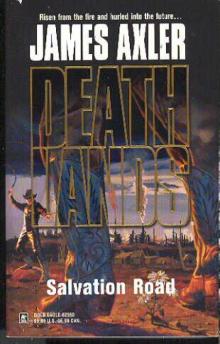 Salvation Road
Salvation Road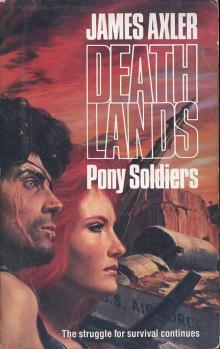 Pony Soldiers
Pony Soldiers Blood Harvest
Blood Harvest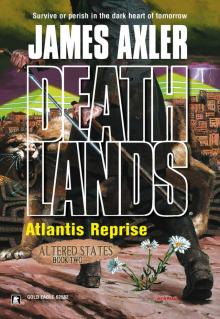 Atlantis Reprise
Atlantis Reprise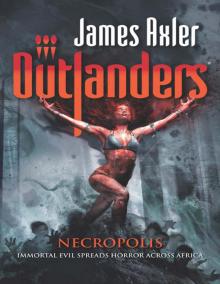 Necropolis
Necropolis Haven's Blight
Haven's Blight Dragon City
Dragon City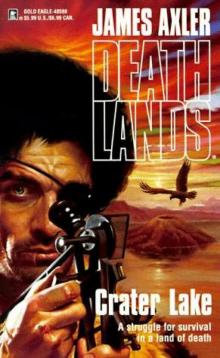 Crater Lake
Crater Lake Storm Breakers
Storm Breakers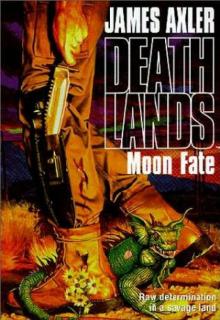 Moon Fate
Moon Fate Eden’s Twilight
Eden’s Twilight Savage Armada
Savage Armada Desolation Crossing
Desolation Crossing Time Nomads
Time Nomads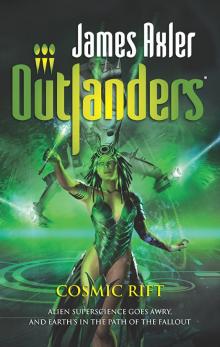 Cosmic Rift
Cosmic Rift Sins of Honor
Sins of Honor Distortion Offensive
Distortion Offensive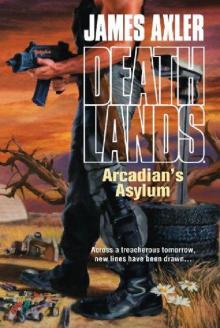 Arcadian's Asylum
Arcadian's Asylum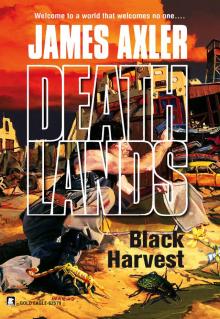 Black Harvest
Black Harvest Iron Rage
Iron Rage Nightmare Passage
Nightmare Passage Labyrinth
Labyrinth Child of Slaughter
Child of Slaughter Cannibal Moon
Cannibal Moon Tainted Cascade
Tainted Cascade Ritual Chill
Ritual Chill Sunchild
Sunchild Wretched Earth
Wretched Earth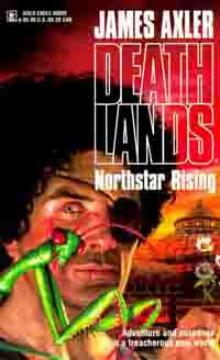 Northstar Rising d-10
Northstar Rising d-10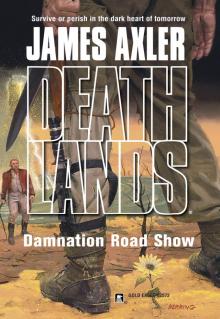 Damnation Road Show
Damnation Road Show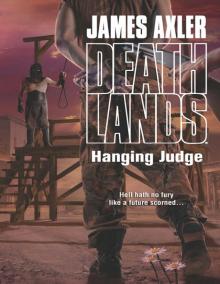 Hanging Judge
Hanging Judge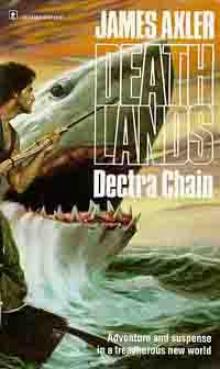 Dectra Chain d-7
Dectra Chain d-7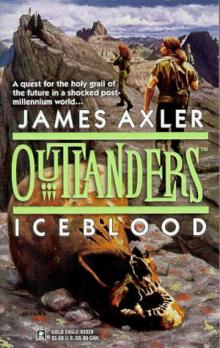 Iceblood
Iceblood Deathlands 074: Strontium Swamp
Deathlands 074: Strontium Swamp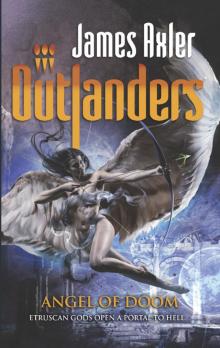 Angel of Doom
Angel of Doom Sunspot
Sunspot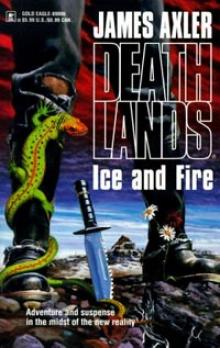 Ice and Fire d-8
Ice and Fire d-8 Pilgrimage to Hell d-1
Pilgrimage to Hell d-1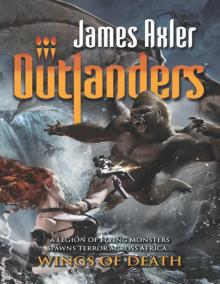 Wings of Death
Wings of Death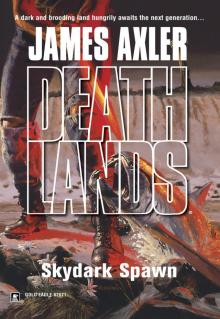 Skydark Spawn
Skydark Spawn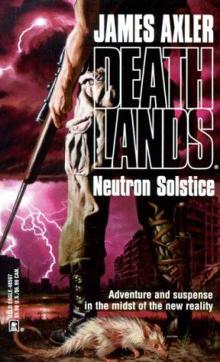 Neutron Solstice d-3
Neutron Solstice d-3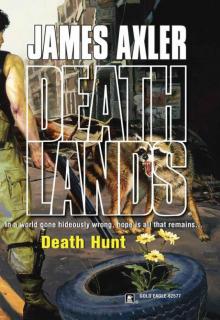 Deathlands 067: Death Hunt
Deathlands 067: Death Hunt Pilgrimage to Hell
Pilgrimage to Hell Siren Song
Siren Song Perdition Valley
Perdition Valley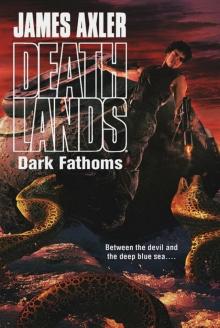 Dark Fathoms
Dark Fathoms Remember Tomorrow
Remember Tomorrow Crucible of Time
Crucible of Time Savage Armada - Deathlands 53
Savage Armada - Deathlands 53 Judas Strike - Deathlands 54
Judas Strike - Deathlands 54 End Day
End Day Dark Resurrection
Dark Resurrection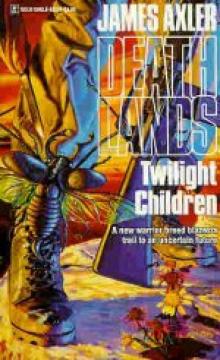 Deathlands - The Twilight Children
Deathlands - The Twilight Children Deathlands 068: Shaking Earth
Deathlands 068: Shaking Earth Breakthrough
Breakthrough Death Hunt
Death Hunt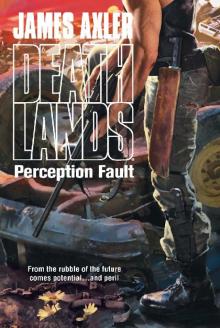 Perception Fault
Perception Fault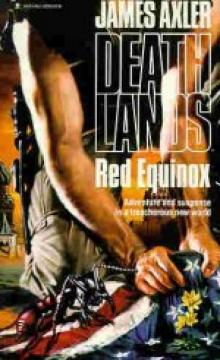 Red Equinox
Red Equinox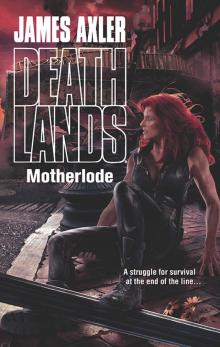 Motherlode
Motherlode Deathlands 071: Ritual Chill
Deathlands 071: Ritual Chill Hell Road Warriors
Hell Road Warriors Downrigger Drift
Downrigger Drift Gaia's Demise
Gaia's Demise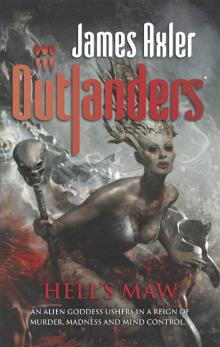 Hell's Maw
Hell's Maw Devil's Vortex
Devil's Vortex Prodigal's Return
Prodigal's Return Deathlands 122: Forbidden Trespass
Deathlands 122: Forbidden Trespass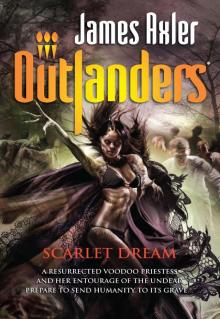 Scarlet Dream
Scarlet Dream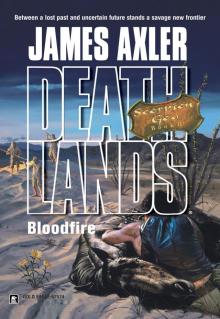 Bloodfire
Bloodfire Plague Lords (Empire of Xibalba, #1)
Plague Lords (Empire of Xibalba, #1)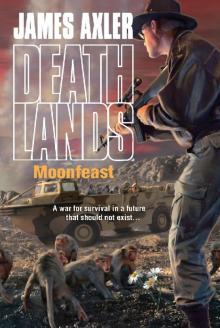 Moonfeast
Moonfeast Latitude Zero
Latitude Zero Lost Gates
Lost Gates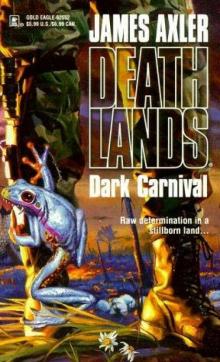 Dark Carnival
Dark Carnival Crimson Waters
Crimson Waters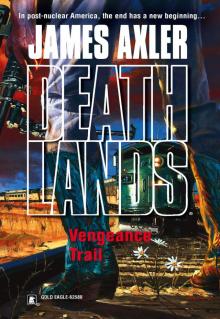 Vengeance Trail
Vengeance Trail Apocalypse Unborn
Apocalypse Unborn Doom Helix
Doom Helix Sorrow Space
Sorrow Space Separation
Separation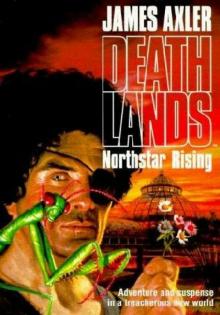 Northstar Rising
Northstar Rising Red Holocaust
Red Holocaust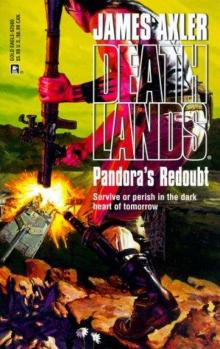 Pandora's Redoubt
Pandora's Redoubt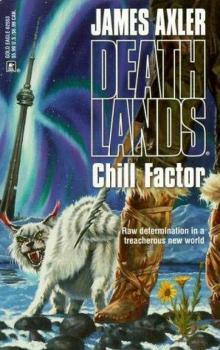 Chill Factor
Chill Factor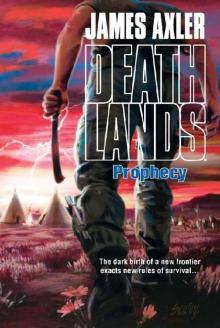 Prophecy
Prophecy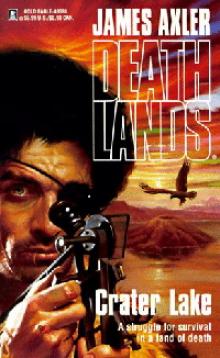 Crater Lake d-4
Crater Lake d-4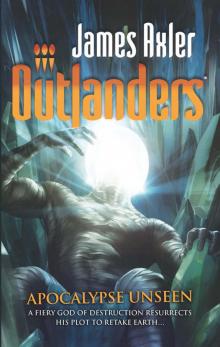 Apocalypse Unseen
Apocalypse Unseen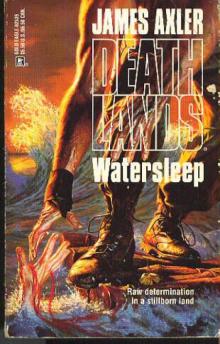 Watersleep
Watersleep Judas Strike
Judas Strike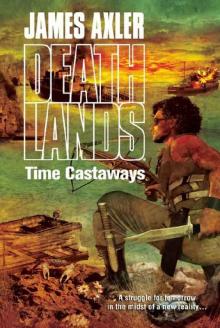 Time Castaways
Time Castaways Baptism of Rage
Baptism of Rage Polestar Omega
Polestar Omega Red Holocaust d-2
Red Holocaust d-2 Outlanders 15 - Doom Dynasty
Outlanders 15 - Doom Dynasty Way of the Wolf
Way of the Wolf Deathlands 075: Shatter Zone
Deathlands 075: Shatter Zone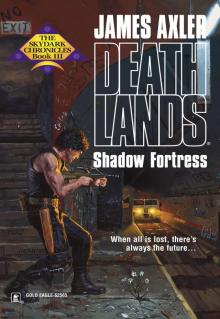 Shadow Fortress
Shadow Fortress Outlander 05 - Parallax Red
Outlander 05 - Parallax Red Shaking Earth
Shaking Earth Playfair's Axiom
Playfair's Axiom Truth Engine
Truth Engine Homeward Bound
Homeward Bound Desert Kings
Desert Kings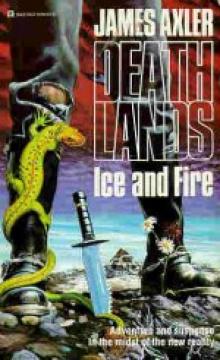 Ice and Fire
Ice and Fire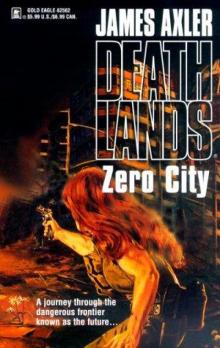 Zero City
Zero City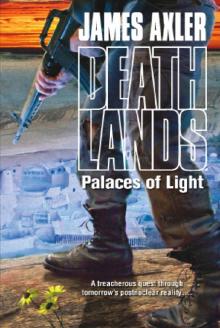 Palaces of Light
Palaces of Light No Man's Land
No Man's Land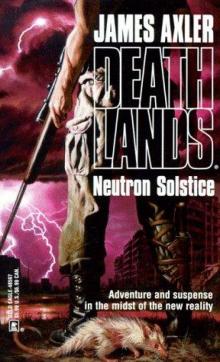 Neutron Solstice
Neutron Solstice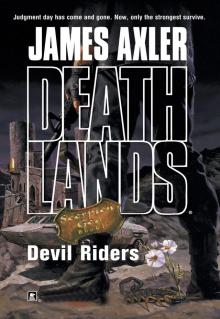 Devil Riders
Devil Riders Thunder Road
Thunder Road Deathlands 118: Blood Red Tide
Deathlands 118: Blood Red Tide Deathlands 114: Siren Song
Deathlands 114: Siren Song Reality Echo
Reality Echo Hive Invasion
Hive Invasion God War
God War Chrono Spasm
Chrono Spasm Judgment Plague
Judgment Plague Blood Red Tide
Blood Red Tide Dectra Chain
Dectra Chain Strontium Swamp
Strontium Swamp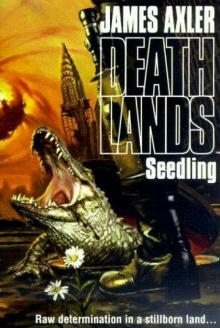 Seedling
Seedling Shatter Zone
Shatter Zone Hellbenders
Hellbenders